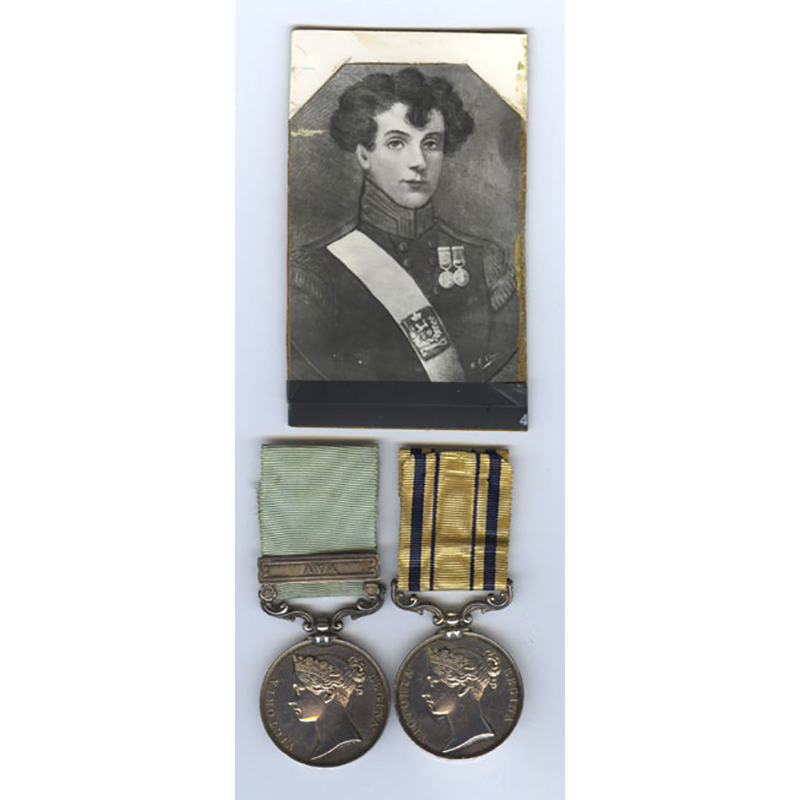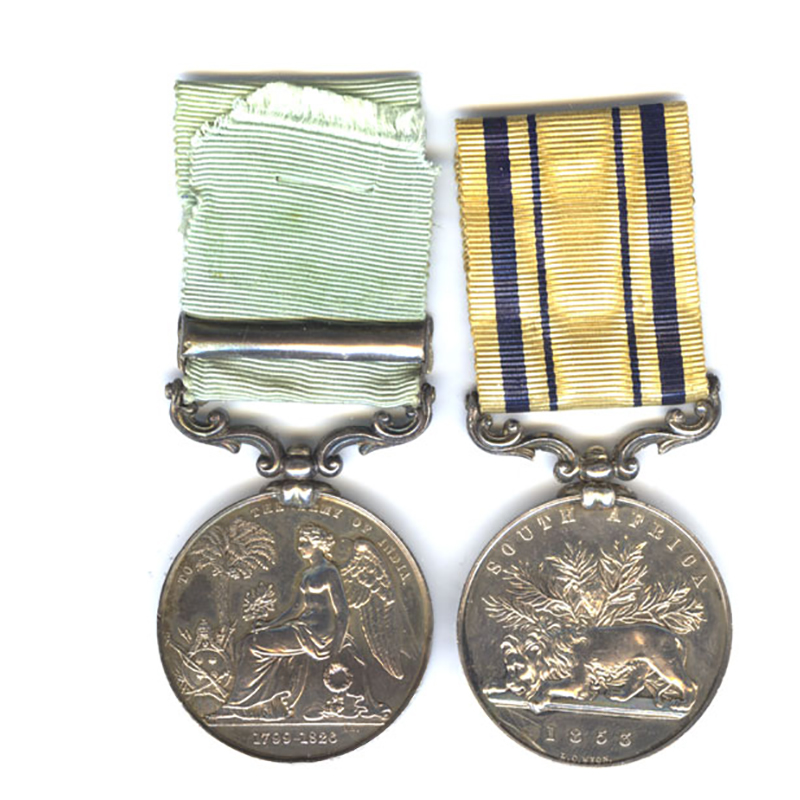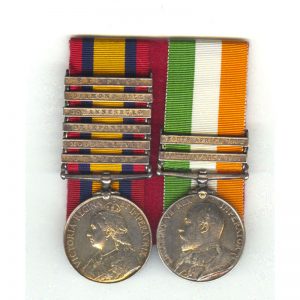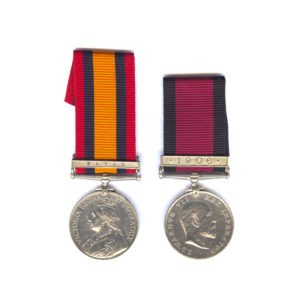Description
Army of India, bar Ava, South Africa 1853, Captain Sir Robert Stanford, 27th Regiment, late 45th Foot & an important South African Cape Colony Pioneer whose tragic story took him from one of the most prosperous farmers in the Cape Colony reducing him to poverty on the streets of Manchester.
Robert Stanford was born in 1806, in the town of Ballina, Mayo, Ireland.
He received an Army commission at the age of ten, with his active army life starting at Nineteen. In 1833 he was promoted to the rank of Captain and on 5th April transferred to the 27th Iniskilling Regiment of Foot serving successfully in Burma, as well as in the 1835-36 First Frontier Wars in the Eastern Cape.
In 1832 he married his wife Eloisa, the only Daughter of Major General Edward Boardman E.I.C., she was a refined and educated lady, intelligent, artistic and also an accomplished Harpist. he also had two sons in England Edward and Joseph.
In 1838 he chose to retire from the army on half-pay and they emigrated to the Cape Colony where Robert Stanford bought the Kleine Riviers Valley Estate of 27000 acres from Major Samuel Parlby for £3000.
He wrote that they were “Blessed with an ample fortune, a happy and increasing family, and a passion for agricultural pursuits.”
He had a fantastic mind for agriculture replacing Parlby’s 3-bag mill with a bigger dressing mill capable of milling 24 bags of grain per day. He employed John Moore, a ship’s carpenter from Cape Town, to undertake the project.
He spent many happy and prosperous years on the farm, so much that he also owned a Town house at Stal Plein in Cape Town and two other farms in the Caleon district, in 1848 he purchased the farms Gustrouw and Fortuintjie near Gordon’s bay, Kogel Bay near Hangklip and Myrtle Grove at the foot of Sir Lowry’s Pass.
In 1849 Stanford decided to settle on Gustrouw and leased the Kleine Rivers Valley to another British officer on Half-Pay, Captain Thomas Smales.
Stanford’s fate forever changed to the disastrous when The British Government chose the Cape Colony to become a Penal Settlement.
On one fateful day in Simon’s Bay on 19th September 1849, Convict Ship Neptune had arrived.
The colonists in the cape refused to have the Irish convicts set foot in the Colony and decided to withhold their food supplies to all government institutions, including hospitals, until it was agreed that the convicts would be sent to some other country (which turned out to be Tasmania) The then governor of the Cape, Sir Harry Smith, became so desperate of food supplies that he ordered the Attorney General, Mr Porter, to speak to Robert Stanford.
Arriving at Gustrouw on 10th October 1849, he informed Stanford that, as a half-pay Officers, he was still in the service of Her Majesty, the Queen of England and requested him to ad the government and supply them with food, whatever he chose.
Stanford then replied that he had signed the pledge of the colonists to withhold provisions to the government and that he would adhere to this until the governor agreed to not land the convicts on South African shores.
Porter then played his trump card, explaining that the governor would declare martial law the next day and take by force from the colonists the supplies they so urgently needed.
Stanford then realised that this would lead to bloodshed and decided to send the much-needed provisions – on condition that the governor grant Stanford full indemnity for his assistance.
His fellow colonists regarded his humanitarian assistance, which likely saved many lives as the highest treason and ostracised him. They refused to purchase his produce, stole his cattle, forced his labourers to desert the farm and refused his children further entry to their school in Cape Town.
Even an Innkeeper who furnished Captain Stanford with a meal found his house at once abandoned, and was obliged to close his business.
The banks refused him credit and called up all his bonds and debts. Despite his desperate plea to the Governor from the promised protection and help, nothing was done to help him.
Finally when his daughter fell ill, the Doctors refused to help and this resulted in her death.
“I was even refused medicines for my family. One of the my children was taken ill at my farm forty miles from Cape Town. I proceeded to Cape Town for medical aid and to send the mother of the child out, and it would scarcely be credited, I would not be let have a conveyance form town to convey a doctor and the mother to a dying child. Late in the evening a carriage was procured by the Governor’s Secretary. the Doctor could not then go; But I followed in a few hours later, but too late, as we met my wife coming back with my dead child.”
Sir Robert had published a volume concerning his affairs, in which he complained of having been utterly ruined in pocket by the attitude of his neighbours and earlier friends towards him.
He then set sail for England in June 1850, to take the matter up with the Minister of Colonies. He was then knighted by the Queen for his assistance on 14th August 1850 but received no compensation.
In June 1851 he again sailed to England where he was promised and excellent employment position by the then Prime Minister Lord John Russell. Stanford replied he needed at least £10000 to tie up his affairs in South Africa, he received £5000 in August 1852.
Upon returning he found out that his trusted friend Captain Smales had all but stripped his farm, disposing of all the oxen and sheep, got rid of the wagons and implements, cut down most of the valuable timer and removed everything he could make a penny from out the farm.
The strain was too much for Stanford, and the compensation from the government no where near what he needed to rebuild, he subsequently suffered a stroke, from which he never truly recovered.
He appointed an Agent, Johan Streytler, to sort out his affairs. On Stanford’s behalf he bought, in cash “In cahoots with an unscrupulous stock dealer”, a large herd of cattle suffering form a fatal lung disease, Second mortgages had to be taken out on his other farms to pay for the debt. Stanford then decided to appoint a fellow Irishman, George Brunette, to attend to his affairs and left for England.
No sooner as he set sail that Brunette sold Gustrouw, Fortuintjie and Kogel Bay, valued at over £5000, for £3000, occurring under very suspicious circumstances.
Stanford’s Son heard that Brunette had then put up the Kleine River Farm for sale, valued at £20000, despite passionate pleas from the family, it was sold to Phillipus de Bruyn for £8044 in December 1855.
The subsequent appeals to the Cape Courts and Privy Council in London fell on deaf ears and the family was eventually reduced to “Genteel Beggary”.
Sir Robert Stanford fell ill and was truly defeated and broken by Life, he was reduced to Poverty and passed away in Chorlton, Lancashire at the Age of 71 on the 20th December 1877. When his estate went to probate, it was valued at under £100, what remained was sent to his ex-wife, who was now remarried.
His estate is now the home of the Sir Robert Stanford Wine Estate and also is the man who the Village of Stanford is named after.







